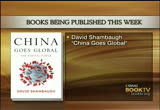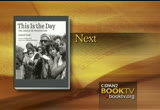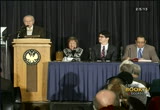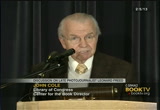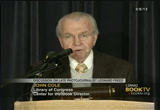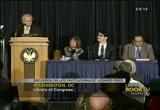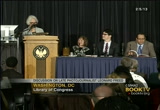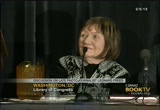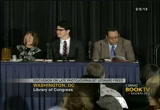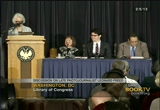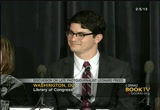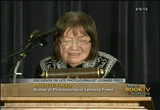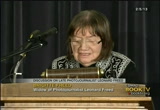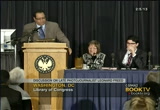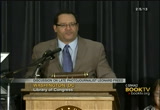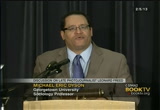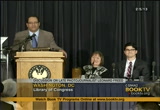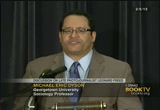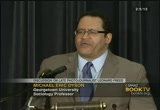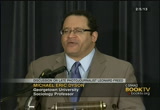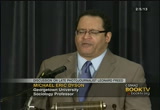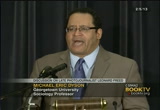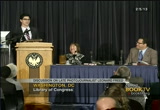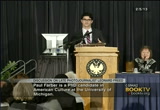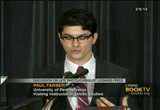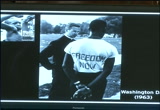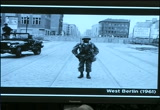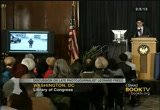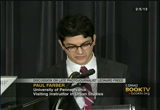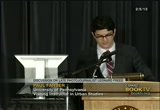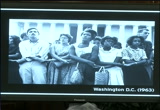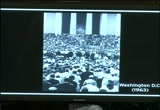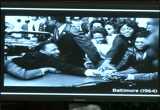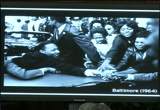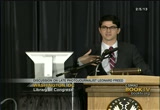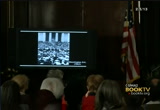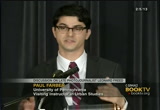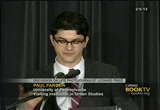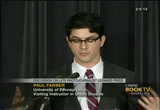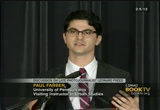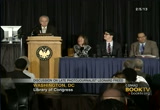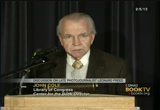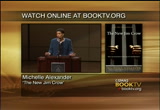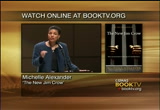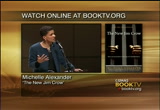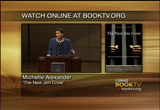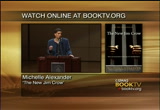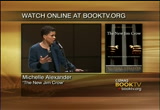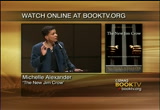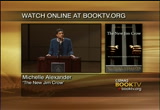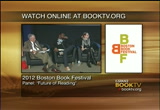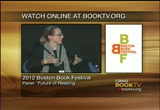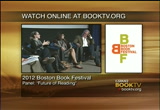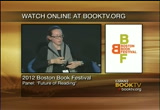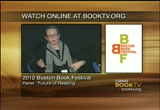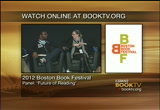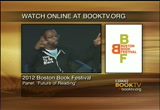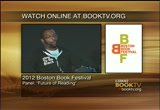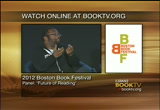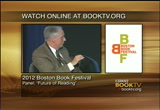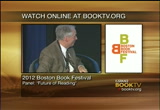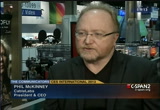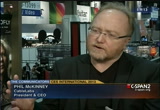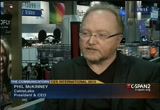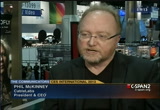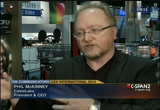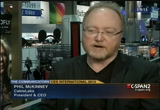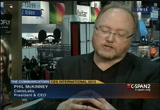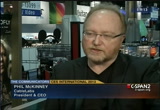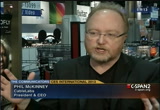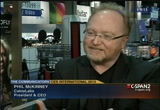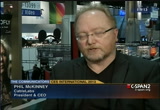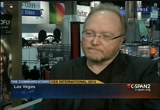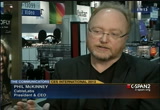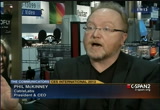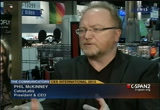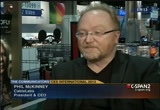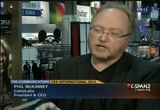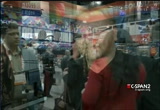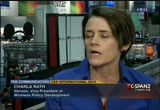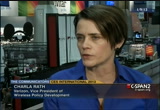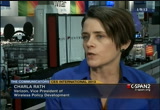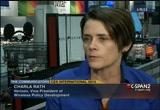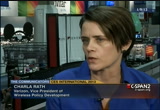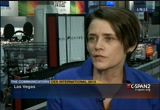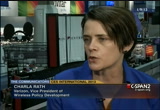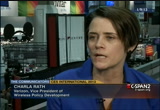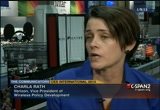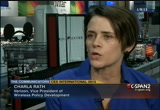tv Book TV CSPAN February 18, 2013 7:00am-8:30am EST
7:00 am
>> look for these titles and bookstores this coming week and watch for the authors in the near future on booktv and on booktv.org. >> the late photojournalist leonard freed documented the march on washington from its preparations to the day of the proceedings and its aftermath. is hundreds of photographs have been curated by his widow,
7:01 am
brigitte freed, and accompanied by an essay for the collection by michael eric dyson. the three discussed the collection next. >> well, good afternoon and welcome to the library of congress. on john cole, the director of the center for the book in the library of congress which is the reading and book promotion arm of the library, and we're very pleased to be cosponsoring this program with the libraries prints and photographs division. the center for the book was created in 1977 to help the library of congress stimulate public interest in books and reading and literacy and libraries. and we are a private public partnership with the library of congress pang our fight salaries, but indeed we have raised private money from the beginning to help support our array of programs and projects.
7:02 am
the our center of the books now nearly state state senator we ha broad audience today and i look, challenge you to look up and learn about the center for the book in your state, which works at the state level in promoting looks in reading and libraries. here at the library of congress, one of our major projects is the national book festival, which i hope many of you know about. it's a library of congress project involving many parts of the library. it is in its 14th year coming up, edition will be held on the national mall september 21 and 22nd. the center for the book also is the administrator of the first young reader centers at the library of congress, which is located now for the jefferson building. it's the only place that focuses on the reading interests of young readers. 16 and under, as long as they are accompanied by an adult. and last year we had 40,000
7:03 am
visitors in the young readers center, so you can tell that we are working hard, not only to raise young readers, but to celebrate reading in all ways. one of the ways we celebrate is through talks such as this. this is in our books and beyond author series. it's a collaborative effort with other divisions of the library to show off books, new books that have been published based on the resources or the projects of the library of congress. and it's a special treat to be working once again with the prints and photographs division but i also like to hold up for everyone to see a book that has come from the collection of the library of congress, in ways that you will learn about in today's program. today, our program is being filmed not only by the library of congress for our website, but also by c-span. and we are very pleased to be able to share this program with
7:04 am
the entire country, both through c-span and through the library of congress' website which now hosts more than 250 of these books and beyond programs. thus, with the filming i as this electronic. we will progress from the panel discussion too, if we have time, a question and answer session, and conclude with a book signing out in the foyer of this mumford room. so you will have a chance, if you don't have a chance for discussion and a question and answer period, you certainly will have that opportunity at the end. there also will be a special display in the prints and photographs division of these photos between one and 2:00. so we have to move along so we postevent features. and to get us started i want to
7:05 am
reduce the mastermind of today's event, bernard curtis. burnet is, i learned today, one of four curators of photography in the prints and photographs division. i'm sure they are all here. it is my pleasure to turn it over to berna curtis. let's give her a and. -- in a hand. [applause] >> thank you very much, john. i have to say that we are all in this together. i'm not the mastermind. today, we have brigitte freed was the winner of the photographer whose work is featured in the book, "this is the day: the march on washington," which we are celebrating. and we have the distinguished dr. michael eric dyson, and we have paul farber. all of them here with us for a special kind of conversation,
7:06 am
which is how we build this. i will tell you a little bit about each individual quickly. because time is of the essence. and i'd like to tell you that brigitte freed was formally brigitte pflueger, and she met leonard freed in rome in 1956. they married a year later in amsterdam where they lived, deciding to leave for life in the united states in 1963, just a few months before what would eventually occur at the march on washington. and i don't think they knew that it was about to happen when they came to the states at that time. bridgett developed and printed leonards photographs for over 20 years. including those in his classic photo book black and white america, and made in germany, and the internationally acclaimed exhibition concern photography. in addition she has had independent careers as both a clothing designer and a real
7:07 am
estate broker. she now lives in paris and new york in the hudson valley, and works full-time on leonards prince and his legacy. brigitte was born in germany, and after living in the united states for over 40 years, she recently became an american citizen. [applause] >> dr. dyson is one of the nations most influential and renowned public intellectuals. he's an essay contributor to the book. he published over 18 works of scholarly and cultural influence, including race rules, navigating the color line, 1996. i may not get there -- "i may not get there without you: the true martin luther king, jr.," and debating race in 2007, and
7:08 am
april 4, 1968, martin luther king's death and how it changed america, in 2008. dyson's pioneering scholarship has had a profound effect on america ideas. dr. dyson is presently professor of sociology at georgetown university, and cited as one of the 150 most powerful african-americans by "ebony" magazine. dr. dyson has been called the ideal public intellectual of our time by writer naomi wolf, and a street fighter incident high by author nathan mccall took pretty good names i should say. you may know him eyesight from as many guest appearances on msnbc, as i do. it has been my pleasure to work with both brigitte and paul farber over the last several years to bring leonard freed's
7:09 am
photographs into the library's collection. paul farber was professor dyson student at the university of pennsylvania, and later his research a system. currently, farber is a lecturer in urban studies at the university of pennsylvania and a ph.d candidate, having just completed his dissertation and american culture at the university of michigan. farber's work on coulter has appeared in the journal criticism, and outlets, and other outlets, five and later, five and later, as was on npr. he was named to inspire 100 list as the world changes for his use of technology and empowering social change. he is working on a biography of leonard freed. let us welcome these distinguished guests and one how leonard freed's images of the historic march in august 1963 changed the ongoing worldwide struggle for civil rights.
7:10 am
7:11 am
benjamin, leonards cousins, and lots of americans. we came here from amsterdam to photograph the blessed people. i have no photo of myself, of our seven-month stay in america but pictures of her four year old daughter, her grandparents and cousins. leonard was very -- he needed all film for his project. nothing but races he said. i wish i had a picture of myself and of leonard at the march on washington. i only had my eyes. and these eyes looked and looked and looked, i would say, all these faces, and when letter to pashtun when leonard asked me how i lik liked the day, i wouly all these faces. the day of the march was america for me.
7:12 am
and then the speech of dr. martin king, i have a dream. the speech was in the air. it moved like a wave over the heads of all those people. the voice was strong, a preacher's voice. it reached everyone. i had never heard anything like this, and and i know i never will. [applause] >> what a powerful testimony to the multiple means by which people contribute to history.
7:13 am
there is no picture of brigitte and leonard freed, because they sacrificed every moment on film for the betterment of this nation. that is more than an anecdote. that is part and parcel perhaps even wolf and warp of the very fabric of american conscious that teen wolf a golden thread into. his majestic oratory that day as ms. freed is indicated as carpal and luminous testimony to the ability of words to move us, a speech to redeem us, and of rhetoric to call us for higher purposes, deeds done, in the name of ideals for which we are
7:14 am
willing to sacrifice. how appropriate then that brigitte freed testifies about these magnanimity of the spirit of her fallen husband, whose shutterbug, whose eye, whose athletic glory has given us -- prosthetic glory has given us testimony to the majestic sweep of the human soul when it seeks to be free. freed from its constraints. freed from the narrow obligation of hatred your freed tuesday. leonard freed, even in his name, gives us a powerful emblem of freedom that we all seek at the end of the day. i'm honored to be here with
7:15 am
ms. freed, and, of course, my student, paul farber who called me into this project, because when he was my assistant, he was my boss. [laughter] and he is one of the most thoroughly organized young people i have ever met, and i am as proud as a pop-up to have -- as a papa to have my jewish son, and oy vey, right here of. [laughter] and he has sprung from not only the loins of his family, but from the powerful collective imagination of people whose love and dedication marked his life as well. the reverend dyson, his wife, my mother is here, rhetorically and symbolically his mother. [laughter] i don't want to get into no baby
7:16 am
mama drama. [laughter] these photographs are not only the emblem of the column, dignity, beauty of black people and their allies who were in quest for the basic fundamental dignity of voting or existing without the artificial constraints of segregation. that day when we listen to, when they listen to the majestic words of martin luther king, jr., and echoing from that mighty mall in washington, d.c., who knew that a scant five years later he would lose his life in memphis? that on that day, this soon-to-be martyr, at the sunlit summit of hope and expectation, would conjure the norms, ideals and beliefs which are the
7:17 am
foundation of american democracy? he was reminding america of what it should be. he gave america a blueprint of what it could be. and he called it into vision, the sweet and powerful romance that the american people have always had with the ideals that nurture us, but which we have not always perfectly obtained. so leonard freed offers photographic testimony to these people's dignity, to the quest for decency. they were dressed in their sunday go to meeting best. at least in 1963. and the nation that frowned upon their lack of humanity that quarreled with them as to the legitimacy of their claims to be fully human. these noble souls marched to washington, d.c. to tell the
7:18 am
nation that despite the repudiation of their fundamental dignity, that they were indeed dignified, that they were blessed is the beauty of moral purpose that could never be exhausted by the infernal and hateful resistance of bull connor, of clark, the sheriff in alabama, those in georgia, those across the nation and, indeed, the south, who did not understand that what these people possessed was mightier than money, was deeper than the rivers that flowed beneath this nation at its founding. they tap into an eternal spirit of resistance in the name of the spirit and of faith and of family and of the quiet dignity of the american dream. martin luther king, jr. colors that dream powerfully that day. is sweet cadence gave voice to a
7:19 am
people who knew that at our best we belong shoulder to shoulder with the great figures in american society. that despite the refusal to acknowledge who we are, and, indeed, then were as people, that our rhetoric would appeal to the nation, even the president, once in bed, another rising from the heated center of the south, to become our advocate. because the president was not in control of providence, but there was a god who spoke from washington, d.c. now for all the blather of our christian experience, for all of the rhetoric of our religious roots when we rejected every bit of that evidence by our own behavior that change any god
7:20 am
that we claimed to be our own. these people remind us that ultimately, the cosmic sense of purpose into which they said, would be enough to see them forward, to force political and social and economic transformation. and leonard freed, both in 63 and in 83, has captured that resistance, that relentless spirit that edifying power that can never be, if you will, put out by the forces of men and women who failed to see the light. i'm proud to be associated with this project, and i'm proud to be with brigitte freed and paul farber to remind us of leonard freed, who freed us from this memory and into has now documented with glory that beautiful calm dignity and the wise purpose of human beings went in search of freedom.
7:21 am
[applause] >> it's as much of a challenge to be on a stage with people who you deeply respect, who have been your teachers in one form of another, and to be here is just that in and of itself as a great honor, and it also sets up a challenge, how do you follow freed and dyson? [laughter] and i think about at the march on washington in 63 when rabbi of the american jewish congress was getting up to speak and he was following the great oak singer odetta hussain oh, freedom, and he starts before
7:22 am
his written remarks. he says quite simply, i wish i could sing. [laughter] so i summon him here and say thank you deeply. good day, and i want to share a few perspectives on leonard freed's work. and a bit about the history and memory of the march, as we are now in the 50th anniversary year of this great gathering. and before do i want to make sure to extend deep gratitude to a few individuals here, to burn the curses been such a great supporter of this project the library of congress are as close to our colleagues at the center for the book, and the curators in the prints and photographs division, thank you so much. dyna berlin from getty publications is the editor of this book and had such a creative and kind hands, and brilliant hand in shaping this. and want to make sure to name her, and though she is no longer with getty publication, first
7:23 am
let the project and set us on a way. so deep thank you. and certainly brigitte freed, you know, you've shared so much with me in terms of your wisdom, allowing me to try to do my part and carry forward leonard's legacy. and i thank you deeply for this opportunity. so leonard freed's 1963 march on washington photographs are among the most elegant and animator of a large body of civil rights era photography, which fueled freed's 1967, 68 photo text black and white america. this work as a whole captures the prevalence of racial division in america, the decade following the 1954 like a mandate to in segregation, leading up to and through the landmarks of rights legislation of the mid '60s. four of the photographs from the march on washington were included in this book, including this one on the slide.
7:24 am
for the march was just one story, or specific photo shoot, amongst dozens of others that included protests, parades, the pageants. to understand the underpinning, the driver this work, is to restore some of its greater context. i want to draw attention to several anchoring images to see this march for freed and for all of us is not just an isolated event. instead, we go through freed. we live through freed to understand what led him to the march, and what ways it brought him forward in his work. freed was born in 1929 in brooklyn, to russian jewish immigrants. by 1960, he'd been living in europe on and off for a decade, and it was there he learned his craft as a document photographer and wrestled with his identity as an expatriate american jew. during the time freed was working on a book of
7:25 am
photographs, book of photographs posted on jews living in germany and the traces and traumas of the holocaust. he ventured to berlin in august of 1961 to check out the scene where there was word that awol was cutting through the middle of the city. with the citizens of both sides staring on the brink of world war iii, freed wandered close to the boundary dividing the city. night on assignment nor with a predetermined edition, who ended out, ended up finding and seeing the most through his cameras were american gis. but here at the wall, freed step to photograph of an end named blacblack soldier standing at te edge of the american sector. freed context from this trip confirmed that this image was powerfully a single shot. taken at a middle-distance in black and white, freed stand
7:26 am
with the subject between a set of trolley tracks that culminate into the imposed boundaries of the wall behind them. this encounter haunted freed. it sent them off course, and beckoned his return from exile to come back to america, to confront segregation and racism. this image would end up being the first photograph in black and white america. and as an annotation in the book, freed sets this out as a point of departure. he writes, we come he and i come to americans, we meet silently and what part of silent. impregnable and as deadly as the wall behind him is another wall. it's there on the trolley tracks across the frontiers and oceans reaching back home, back into our lives and deep into our hearts, dividing us where ever we meet. i am white and he is black.
7:27 am
setting out from this point, freed him to represent and encroach upon america's racial buffers it because after this opening image, with its multiple boundaries, freed would ferry his own perspective, perspective being that measure distance between a photographer and his subject, to approach and acknowledge their humanity and their shared existence. he photograph many african-american subjects in his project, and also whites, too, embedded within one interconnected system of race. and he does so by capturing and representing his subjects fields of vision. what they see, how they see each other. to make visible the terms and conditions of segregated powerline society. the summer of 63, freed and his family ventured back to america. he photographed in the boroughs of new york city, and would you look back to the context of this
7:28 am
period, the traces of the march begin to emerge and you see the button with the handshaking closely in there as the march headquarters were centered in new york. leonard and brigitte freed marked off so days of the event on august 27, they drove down and camp outside the city. on august 28, they arrived in washington, d.c. at dawn. freed began his day on the periphery of the national mall, capturing scenes on his handheld camera. he walked from the base of the washington monument to the vendors outside of the white house, and to the streets surrounding ford's theatre. several blocks from the epicenter of the march, freed captured some of the first photographs of the day under assignment red house where lincoln died. free to make photographs of passersby as they crossed one another's path. envisioned this foot traffic as a prelude to the later gathering at the lincoln memorial at
7:29 am
because on that day, freed was tapping into the deeper currents of historical memory, on the spot studies of interpersonal geometry and geography. freed sought images in which he could bring the marchers and the latest other social landscape and architecture into a shared frame. to see this day from a panoramic perspective was also the ability to pay attention to a crowd and individuals, with faces, and really to walk alongside and amongst them. that they offered freed, not to marvel from afar or at a fixed distance, but to explore the march at its ground level. freed me hundred through multitudes on the mall, and the resulting images attest to his thoughtful photographic eye, as was his active footwork throughout the day.
7:30 am
and but if we return to thinking about the role of lincoln and have freed invoked him, 100 years and eight months after the emancipation proclamation, we see one of the only full shots of the statue of the former president included in this work. it happened to be the same frame which is the only photograph of the day's keynote speaker, dr. martin luther king. ..
7:31 am
>> on october 31, 1964. freed had gone back to europe and then returned again, and king himself had just gotten back from europe. and on this trip it was announced that he would receive the nobel peace prize, and this was one of the first public gatherings in his honor. freed devoted a full day to photographing king in baltimore including at a parade ohioaning him and a speech -- honoring him and a speech at a local synagogue. this photograph from the parade is included in "black and white america" and has taken on prominent status of itself, a cropped version of king's hand with the parade goers nearby as the cover says "pillars of fire." king is definitely the centerpiece of this photograph, but like with the march images, we immediate to think -- we need
7:32 am
to think about how freed accounts for the crowd around the man. and, again, freed's potential place within this crowd. we can consider where freed was standing. was he close enough to reach out and touch the car or touch king? or as you see an arm reaching around king touch bayard rustin who in another frame is pictured to king's left? but when we consider the deliberate inclusion of a blurred face on the right-hand side of this image, we have to take a step back and really consider whether leonard was close, what his perspective was, and if we think of him as part of this scene or being in its way. this was deliberate, of course. freed fully believed in printing and accounting for photographs all the way to the frame with no cropping. and unlike the black soldier in berlin, this is not a single shot, but chosen out of several
7:33 am
frames and perspectives. freed is part of the scene, and in a way he reminds us of the photograph's power to mark social distances between field and king, between king and the collectives around him. but to represent these divisions, to challenge them and to remind us of the persuasive power of coexistence. there's more to say about freed's approach to photographing king in 1965 as he follows him to alabama and especially after his assassination. we can think about king as being an ongoing subject of freed's work, and this is a shot included in "this is the day," but of the commemorative 20th anniversary march. and here we get a sense of a call to galvanize around king's image, but we also have his absence truly marked again. and as dr. dyson has brilliantly and powerfully written how april
7:34 am
4, 1968, truly changed america, we get a sense of that day cascading forward, and freed reminds us to think about king and think about his collectives. as we close, i want to think about and put forward some of my hopes for "this is the day," and to do a small part to carry forward the history and memory of the march on washington, to summon a few significant names that we want present here with us. while king's treatment is extensively excerpted and echoed and envisioned -- and properly so -- it serves as the iconic memory of the march. but i also hope leonard freed's photographs remind us to visit the full message that king put forth and to seek out more of the stories of the 50,000-
7:35 am
250,000-plus marchers and all those who they impacted and all those inspired from that point to fully understand the march on washington as the greatest gathering toward democracy on american soil and to understand it as a noble blueprint of social change that we still have with us. in other words, to see the day of the march on washington -- august 28, 1963 -- as a living archive of and to see this book as one of many potential tools of thought. there are many names to name. more, i hope, as we approach the 50th anniversary this august, but i offer a few now. i say carol corazon, my first and second grade teacher in philadelphia who attended the march on washington. ms. corson was a white quaker woman, and she shared stories with us about her time there, and what she put forth to all of us had to do with understanding
7:36 am
what your convictions are and being not just present with them, but being present with other people in sharing them. of course, we say the name dr. martin luther king, our american genius and prophet, whose words and action deserve ongoing illumination and critical exploration and complex consideration. julian bond, a young leader and participant in the march who's carried forward the spirit of this gathering and brought forward the mantle of civil rights movement along lines of race, class, gender, sexual orientation and stays as a morl compass and bellwether for us. though this day was trium fantd, thereafter remained the reality of hatred and violence. so this year as we happily mark the 50th anniversary of the march, a month later we'll also mourn five decades since the brutal womaning of the church in
7:37 am
birmingham where cynthia wesley and te niece mcnair were murdered. they, too, deserve our commemorative memories this year. and our hearts are still heavy with the lost -- the loss last year of hawaii dee ya pend lton just days after marching here in d.c. for an inaugural parade of the inauguration of barack obama. we bring hah dee ya forward because even as the national mall is a space of healing, the symbolic justice granted for those of us who go to it can only be teed further with -- garon field further beyond the -- to carry us forward through tragedy and towards transformation, we say the names of dr. michael welcome dyson.
7:38 am
scholars and leaders like them, they have taught me and so many others so much about intellectual inquiry that flows through the head can and the heart and always between peoples. to the 250,000-plus attendees of the march whose names we don't know well enough, we hope to know more of you. we want to hear your stories, and we want to be able to both record them and speak them out ourselves. as they'll nourish both our history as well as our pathways forward. and finally, re gnarled freed -- leonard field whose photographs of the march on washington affirm the profound beauty and historical significance of the gathering as they frame democratic transformation. in leonard's memory and with his photographs glimpsing the past and informing our futures, we say his name, leonard freed, and
7:39 am
express our gratitude for all of his contributions. this is the day. thank you. [applause] >> well, of course, i want to express our gratitude to our three speakers. this has really been a terrific program, and they have made it such. we're going to continue the gathering in the foyer with both the book selling and a reception and with the display down in princeton photographs, but first i just want to say another word about this beautiful book which will be on sale, and you can get it autographed in the back. it not only was produced by the getty museum, but it does have -- and paul spoke of julian
7:40 am
bond who has produced the forward. dr. dyson has an essay in it, and taken by itself, you know, it is really a wonderful commemoration and event by itself that moves the thoughts forward, as paul did at the end of his talk. it's a truly an example of how a book can both be a catalyst, something beautiful in itself, and, if you will, a call to action in the spirit of the event and in the spirit of the best kind of collaborative publishing, publication event and just as this was, as verna said, a wonderful, collaborative event on the part of many people at the library of congress and in the publishing world. so before i call you out to get your book, get it signed, meet each other and go down to the princeton photographs division just between 1 and 2:00 to see
7:41 am
some of the photos and this wonderful gift to the library of congress -- thank you so much -- let's give our speakers and verna another round of applause. [applause] >> you're watching booktv, nonfiction authors and books every weekend on c-span2. >> this system of mass ip cars ration is -- incarceration is now so deeply rooted in our social, political and economic structure that it is not going to just fade away or downsize out of sight without a major upheaval, a fairly radical shift in our public consciousness. now, i know that there's many people today who will say, oh, you know, there's no hope of ending mass incarceration in america, no, no, there's no hope. pick another issue. just as many people were
7:42 am
resigned to jim crow in the south and would say, yeah, yeah, that's a shame, it's a shame, but that's just the way that it is, i find that so many people today view the millions cycling in and out of our prisons and jails today as just an unfortunate but inalterable fact of american life. well, i'm quite certain that dr. king would not have been so resigned. so i believe that if we are truly, truly to honor dr. king, if we are to ever catch up with king we have got to be willing to continue his work. we have got to be willing to go back and pick up where he left off and do the hard work of movement building on behalf of poor people of all colors. in the 1968 dr. king told advocates the time had come to
7:43 am
transition from a civil rights movement to a human rights movement. meaningful equality, he said, could not be achieved through civil rights alone without basic human rights; the right to work, the right to shelter, the right to quality education. without basic human rights, he said, civil rights are an empty promise. so in honor of dr. king and all those who labored to end the old jim crow, i hope we will commit ourselves to building a human rights movement to end mass incarceration. a movement for education, not incarceration. a movement for jobs, not jails. a movement to end all these forms of legal discrimination against people, discrimination that denies them basic human rights to work, to shelter and to food. now, what must we do to begin this movement? well, first i believe we've got to begin by telling the truth, the whole truth.
7:44 am
we've got to be willing to admit out loud that we as a nation have managed to recreate a caste-like system in this country. we've got to be willing to tell this truth in our schools, in our churches, in our places of worship, behind bars and in reentry centers. we've got to be willing to tell this truth so that a great awakening to the reality of what has occurred can come to pass. because the reality is that this new caste-like system, it doesn't come with signs. there are no whites-only signs anymore, there are no signs alerting us to the existence of the system of mass incarceration. and prisons today, they are out of sight and out of mind. often hundreds of miles away from communities and families that might otherwise be connected to them. and the people who cycle in and out of these prisons typically live in segregated, impoverished
7:45 am
communities, communities that middle class folks, upper middle class folks rarely come across. so you can live your whole life in america today having no idea that this system of mass incarceration and the harm it wreaks even exists. so we have got to be willing to tell the truth about what has occurred, pull back the curtain and make visible what is hidden in plain sight so that an awakening can begin and people can begin to take the kind of creative, constructive action that this moment in our history surely requires. but, of course, just a lot of talk and consciousness raising isn't going to be enough. we have got to be willing to get to work. and in my view, that means we have got to be willing to build
7:46 am
an underground railroad for people released from prison, an underground railroad for people who want to make a genuine break for real freedom, people who want to escape this system and find work, find shelter, be able to support their families. find a true freedomment -- freedom in america today. we have got to be willing to open our homes, open our school, open our workplaces to people returning home from prison and provide safe spaces of support for the families who have loved ones behind bars today. how do we create these safe places? well, one thing we can certainly do, we can begin to anytime our own criminal -- to admit our own criminality out loud, our own criminality. because the truth is we've all made mistakes in our lives. we all have. all of us are sinners, all of us have done wrong, all of us have
7:47 am
broken the law at some point in many our lives -- at some point in our lives. if you're an adult, you've broken the law at some point in your life. now, i find that some people will say, oh, yeah, i'm a sinner, i've made mistakes, but don't call me a criminal. don't call me a criminal. i say, okay, well, maybe you never drank underage, maybe you never experimented with drugs. well, if the worst thing you've done in your entire life is speed ten miles over the speed limit on the freeway, you've put yourself and others at more risk of harm than someone smoking marijuana in the privacy of their living room. but there are people in the united states serving life sentences for first-time truck offenses -- drug offenses. life sentences. the u.s. supreme court upheld life sentences for first-time drug offenders against an eighth amendment challenge that such
7:48 am
sentences were cruel and unusual in violation of the eighth amendment, and the u.s. supreme court said, no, no, it's not cruel and unusual punishment to sentence a young man to life in imprisonment for a first-time drug offense even though virtually no other country in the world because such a thing. so we've got to end this idea that the criminals are them, not us. and instead say there but for the grace of god go i. all of us have made mistakes in our lives, taken wrong turns. but only some of us have been required to pay for those mistakes for the rest of our lives. in fact, president barack obama himself has admitted to more than a little bit of drug use in his lifetime. he's admitted to using marijuana and cocaine in his youth. and if he hadn't been raised by white grand parents in hawaii, if he hadn't done much of his illegal drug use on
7:49 am
predominantly white college campuses and universities, if he had been raised in the hood, the odds are good that he would have been stopped, he would have been frisked, he would have been searched, he would have been caught, and far from being president of the united states today, he might not even have the right to vote depending on the state he lives in. >> you can watch this and other programs online at book tv.org. >> here's a look at some of the upcoming book fairs and festivals happening around the country. during the second weekend of march, booktv will be live from the tucson festival of books in arizona. among several authors features are timothy eagan and kristin iverson. be sure to check out booktv.org for updates on the schedule. the virginia festival of the book begins wednesday, march 20th and runs through sunday, the 24th. this annual charlottesville, virginia, event includes douglas
7:50 am
brinkley and congressman john lewis. also that weekend it's the 26th annual tennessee well yams new orleans literary festival in louisiana. it'll feature its third annual poetry contest, highlight presentations by authors william j. myth and patricia brady. florida will host the venice book fair and writers' festival during the first weekend in april featuring author presentations and readings in the historic venice theater. please let us know about book fairs and festivals in your area, and we'll be happy to add them to our list. post them to our wall at facebook.com/booktv or e-mail us as booktv@c-span.org. >> i want to move to the role of publishers in this new world. it used to be that publishers would take care of all distribution, they would take care of production, and they would provide the answer. and that, that series of services led them to take a very
7:51 am
hefty cut, a 95% cut. now, now you don't need production because you can put it out on the web, you don't need an advance because it doesn't cost that much to write, or you can crowd fund the advance using something like kick starter, and you don't need the distribution, again, because you can put it on the went. so what is the changing role of publishers in this new world where production and distribution and financing are starting to be taken by different technologies? >> so there's a lot in there, and let me kind of unpack it. first, actually, i disagree fundamentally with a couple of things. there are production, distribution costs and, um, you know, it is tasks involved whetr it's tingal or physical. i think it's -- digital or physical. i think it's very easy to think that digital is free, and it's not. i mean, there's a lot of backlash, actually, if you will,
7:52 am
over some of the early books, and we've got an extensive back list, thousands and thousands of titles that we need to go back and convert. there's a conversion process that takes place, and there's a lot of care and feeding that goes into that because in the early days when you're just sort of literally scanning books to get them into an e-format, you just were not replicating the book properly. so, first of all, there's still a production not just cost, but entirely new competency around production of a digital book and presenting them a properly. i'm actually looking at our head of children's publishing who's smiling because she knows she and i have these conversations all the time. when you talk about children's books and how to produce something, um, that is for color that convey it is gorgeous illustrations, um, that the artist intended --? >> but if that's true, sure orally that's only true for the first copy. >> correct. >> and every one thereafter is
7:53 am
free. because there's no, there's no marginal cost to make ten million copies. >> right. you lose paper, printing and binding. >> yeah. is so that's marginal -- >> yes. the marginal cost of paper, printing and binding. the other thing i would say -- >> and shipping. >> and shipping. >> and warehousing. >> not necessarily -- [laughter] [inaudible conversations] >> no, not necessarily. there's a, there is a deep infrastructure that is needed to support digital operations. the other thing i'd mention about the state of publishing today is if you talk about the future of reading, the future of publishing, you know, where are e-books going to go, that's kind of the big question, will it be a complete swapping out of the physical for digital as has happened, you know, in music and film -- photography, that is. in book withs, um, i believe
7:54 am
there's not going to be that swapping out 100% of physical for digital. children's books, i think, are a great example where there's a very, very strong desire to have a physical book to flip think with your child. now, that's today. five, ten years from now, you know, we might be speaking about something different. but today publishers are in a world where they can't be jumping tracks from the physical to the digitalling wholly, we're truly supporting two businesses. so you're continuing to support the print business while continuing to support the digital business. upside lying that is sort of a third business that you are cultivating which is getting to a place where we're not talking about the conversion of e-books. so merely taking what used to be in a physical form and now porting it over into a digital form, but the creation of digital products, the creation from really creating a digital product from conception, something that was initially conceived with the author,
7:55 am
developed with the author to be a completely new digital product. so the role of publishers in that scenario -- because the one thing that you had sort of forgotten, i think, on your list of what publishers do, it's really the heart of what we do, the editorial. >> right. >> it's really bringing that story, you know, shaping that story with the author and bringing it to market in the best possible way. that still exists and exists, i think, in a more, in even more exciting ways when you talk about the creation of digital-only products. [inaudible conversations] >> shaping the story may be the only role actually. because there's almost nothing left after -- helping shape the story. >> that's just wrong! [laughter] i always wanted to get my john mclachlan on. but, no, seriously, you're wrong. [laughter] i will say this, you know, as the other side. we're partners here. she's not my publisher, but she is a publisher. >> she might be. [laughter] >> i'm happy where i am. but, you know, i had a very
7:56 am
explicit arrangement with harper about, like, who's doing what here. and, again, because i came from more of a digital foundation, i was just skeptical of everything. i can do that, i can do that, i can do that too. i got spell check, what have you got? [laughter] and it turns out i was wrong about a few things, i was right about a if things -- a few things, and i learned a ton in the process. of course, i could have independently hired a great writer/editor to help me through the process. i was happy to have the support of barry harbaugh at harper, that was very cool. the distribution of the physical, that i ignored completely. i basically got free advertising across the nation on book shelves. i can't buy that. no single person can afford to distribute 10, 15, 20,000 book into hundreds and hundreds of bookstores and libraries all around the world. and digital-only doesn't do that. you cut off the physical marketing in that sense. so that helps support the
7:57 am
digital. when they ran out of physical books, my e-book sales spiked. so there was a level of demand regardless of format, and people literally, you could see the chart, they switched over, but they would have probably gotten a physical one. and then the actual marketing of the thing, me and my campaign manager for the book, a guy named craig who i met through the onion, we built this rabid internet army digital plan, and harper did the more traditional big media plan. and got me on msnbc and all these things, again, that's a network game. and that's a roll decks game. and there's afy neat amount of people that can make that sort of thing happen. and the flood of authors can't all pull that off on their open. so i, you know, found that i was wrong that publishers are useless -- [laughter] and i was glad for it, you know? because we were splitting this here money, and i want to make sure that we're both doing something. [laughter] and i learned a lot about, you
7:58 am
know, the excitement, the upside and the limits of what, you know, individual authors or authors who create a collective or create their own kind of digital presence. but there's a flood of readers, there's also a flood of writings in words, tweets, blogs, also books. there's more books than ever, and how do you discover, how do you convince somebody that you're worth their time? you know? attention is the currency. and when you spend it watching a cat play a fiddle on youtube -- [laughter] or reading about the future of blackness, like, that's an equal choice to some people. [laughter] in the bit world we're just competing for pixels, we're competing for real estate, we're competing for mental real estate, and there's so many extra writers competing for attention that a publisher who knows what they're doing can add a little extra weight on top of the individual kick starter-moving artist orsome who's got a blog platform, i'm
7:59 am
going to print out my blog and call it a book. >> i think that's true, you're an exception because you wrote a best seller. the shelf life of a book, i'm sure that sheryl would confirm this, is a matter of weeks or days, and most books don't make it into bookstores. we're live anything a different world. now, i agree in this world publishers are crucial. i'm really worried about booksellers, however, because that middle person is beginning to disappear, and outfits like amazon are transforming the way books reach readers. and then there's a movement in the other direction that i think very few people have noticed. there were about 350,000 new titles published in the u.s. last year. that's a 6% increase over the previous year in paper. the book industry's actually doing very well, although publishers are always wringing their hands and saying it's the end of the world.
8:00 am
[laughter] but compare with that 350,000, 700,000 books were self-published, twice as many books are produced by independent authors who put them online and have something to say. now, you might claim that there's a lot of garbage among that 700,000 books, but i think there's a lot of good stuff as well. so i really feel that if you look at the publishing industry, i don't know if you would agree, we are witnessing a transformation in its structure. so is some of the middle intermediaries are moving out, and somehow the public is moving in in strange ways. it used to be said that books were written for the general reader. now they're written by the general reader. [laughter] >> you can watch this and other programs online at booktv.org. >> host: and you're watching "the communicators" on c-span. we are on location in las vegas
8:01 am
at ces international 2013 at the las vegas convention center. here's some of our interviews that we did this week. well, this week on "the communicators" we want to introduce you to phil mckinney who is the new president, ceo of cable labs. mr. mckinney, what is labs? >> guest: cable lab is the the r&d innovation labs for the cable industry, and we're the force that really enable the cable operators to deliver the services such as broadband, video and now even voice over cable. >> host: you are not a cable guy. [laughter] >> guest: no. i'm new to the cable industry. i came from the consumer electronics, but earlier in my career i was primarily in telecommunications, so i am new to cable. >> host: well, chief technology officer at hewlett-packard? >> guest: correct. >> host: what do you think you bring to cablelabs?
8:02 am
>> guest: from my standpoint is that perspective of not just the core technology, but how that actually gets used by the consumers. and my role at hp we focus a lot on what do people actually do with the technology in their home, the technology in their hands on or their desk? what does that derive from a benefit and productivity perspective? so being able to look at that from end to end. in addition, i'm an innovator by background, so for me it's about coming up with really great ideas and translating those into high impact. >> host: what are some of the projects you're excited about at cablelabs? >> guest: we've been looking at all of the programs that we have currently running, and we've really narrowed those down to some key focus areas. one is the work that we're doing on new access network technology. how do we go kind of beyond the feed that we see today? commercially in the u.s. you can get upwards of 100 megabits through a cable operator. we just announced work on dock
8:03 am
sis 3.1 that will allow the cable operators to offer you ten gig on a download and one gig on the upload speeds, and you'll start seeing that, you know, as we get those technologies refined. but that's kind of where we're seeing that progression. so higher capacity, better technologies on the network side bringing you more capacity to watch those videos and, you know, communicate with your friends and all kinds of things. >> host: is that going to take new hardware, new wires into the home? >> guest: no. it actually takes advantage of the investment the cable industry easel already put -- industry's already put in place. they've had in this great history of making this investment over this period of time. all of that coax that come into your house has, you know, a phenomenal amount of capacity in it. so the technologies we're developing takes advantage of these advances in technology and allows the cable operators to take advantage of the capacity they've already invested in. >> host: phil mckinney, is the
8:04 am
cable industry a growing industry? do you see a long future for that industry? >> guest: oh, yeah, definitely. i mean, from the standpoint of cablelabs, keep in mind our membership is world wild, not just the -- worldwide, not just the u.s. in china there's estimationings there's going to be $30 billion spent in the cable industry alone over the next five years. even here in the u.s., we're still seeing growth. if you look at the growth rate in data usage from subscribers from cable data services, we're seeing anywhere from 30, 40, 50% rates on an annual basis, and there's no slowing down. so there's just this insatiable hunger for more capacity, faster or speeds. and so the cable industry has a long, long future in being able to be that provider of choice for those services. >> host: when you look ten years down the road, how are people going to be viewing video, viewing tv? same way they are today? >> guest: no. i think you're seeing that shift already. the role of the second screen in
8:05 am
a living room, what -- in five years from now, what's the concept of a channel? you know, today we think of channels as this linear up/down on your remote control. hold up how -- how many of us wh linear television in realtime? we've kind of gotten into this time hiv shifting model. i may record it on my dvr in my living room, but i want to watch it on my tablet when i'm out and about, and i think your going to see just an explosion of the devices and the way consumers want to enjoy the content. they want to enjoy it when they're out, when they want it, and they want to see the content they want. they don't want to be tied to identify got to be home at 8:00. so i think you'll see a shift of what's the concept of subscribing to a channel, and you'll see the shift as far as what device i want to enjoy it on. >> host: about a year ago you published your first book, "beyond the obvious." what's the topic? >> guest: it's really about innovation. i'm a believer that creativity
8:06 am
and innovation is not a special gift, you know? you're not blessed with it and somebody else got skipped. it's a skill that anybody can learn, anybody can become proficient at and anybody can benefit from whether it's in your business world or even your family world. so the book is based on the seven years of the podcast that i've been producing. it's, you know, i kind of lost track, 30,000 listeners of the podcast. and this was, basically, to take all of that experience and information and make it widely available, make it available to small businesses all the way up to large organizations so that all could bicep fete from, basically -- benefit from, basically, revealing what some may think are secrets. it's just basic skills, and it's hard work. innovation is not, you know, the serendipity thing that everybody imagines it is. it's hard work, but anybody can become proficient at it. >> host: what's bhag? [laughter] >> guest: bhax is a term i use for bold, hairy, audacious goal.
8:07 am
what i found with teams, even the nonprofits i'm involved in, is if you really set the bar, you really define the hairy, hard problem, the really lofty goal, if you set that and define it properly, you will be amazed at how the human spirit is to achieve that, how people will come together around that common goal to really, to really achieve that. you know, the space program here in the is a perfect -- in the u.s. is a perfect example. kennedy laid out the objective of putting a man on the moon before the end of the decade. any organization when -- with a properly-defined bhag can achieve far beyond what they've set for themselves. the bhag for the cable industry are along the lines of the transitions we're seeing in the industry, you know? all ip, you know? what does the network look like. the fact of this explosion of devices, how do we transform the network technology to be open to
8:08 am
all these kinds of devices? some of the bhags we're working on are along the lines of security, you know? privacy. new kinds of content forces. you know, the fact that content coming from traditional programming channels, the amount of content people are listening that are coming from nontraditional channels, what does that mean? so we're in the early stages of really defining kind of, you know, a handful of two or three of those bhags to really lift the entire industry. >> host: well, i'm sure you're familiar with webosnation.com. very critical of the cable industry, and, in fact, they say they've crunched or scrunched technology advances. what's your response to them? >> guest: i would disagree from. the standpoint of the cable industry, when you think about the amount of dollars the cable industry invested over its entire span, very few industries around that have put that much dollars to build out a capability that's there.
8:09 am
the challenge you got is when you serve 98, 99% of all homes in the past, any technology you inject into the network, you've got to think about it on that kind of size and scale. you know, it's part of the challenge even in my believes life of when you're dealing with $40 billion in revenue, any new technology you inject you have to think about it in the context of scale. and i think scale can be sometimes cause you to move a little bit slower than you would if you were a small little start-up bringing in a new idea or new technology. and part of what the ceos from the cable operators who are my board for cablelabs, what they clearly have tasked me with doing is picking up the pace. rather than taking four years to come out with a new technology, how do we do it in two years? how do we do it in one year? one of the core premises we've now laid out for cablelabs is to really pick up that pace. because we are at that kind of early stage. we're the beginning of that new idea, the beginning of that new innovation that ultimately roll into the cable industry. >> host: what differences have
8:10 am
you discovered between silicon valley, culture and cable culture? >> guest: well, i think if you look at the cable cull which are, cable culture is very, very intrep neural. people kind of discount it thinking it's just these big, monolithic companies. but still a lot of the cable industry is still family owned. think of the cox communications, you know? still a family-owned business. cable industry came up as family of-owned. so very entrepreneurial. they don't shy away from the risk of investment, but it's their own money rather than raising money from the stand point of the traditional vc model. what's also unique about the cable industry is how well they cooperate. there's no other industry that i've ever been involve inside where you can bring an entire industry together to have a conversation, get alignment, align those investments to make -- to get things done fast and in some form of cohesive way. very unique which in the case of silicon valley you've got all these little companies all
8:11 am
competing against each other. >> host: phil mckinney, in your career have you had to deal much with washington and policy issues? >> guest: i have in my past. i was one of the original executives for a select carrier based in washington d.c. so i spent my fair share on the hill in front of the fcc talking about, you know, spectrum auctions and those kinds of things. but it's been a while. in my current role i don't have responsibility for policy for the cable industry. michael powell, who's the ceo for ncta who leads that effort for the industry, michael and i have known each other for many years, and it's a great partnership. >> host: what's the future of wireless when it comes to the cable industry? >> guest: wireless is, actually, a growing interest for the cable industry. last may at the cable show in boston the cable industry announced the top six carriers coming together and stitching together their wi-fi foot prints under a service we call cable wi-fi.
8:12 am
so that's in the process of being built out. we've got, you know, cablevision, comcast, time warner, cox, etc. all bringing those networks together. so if you are a cable subscriber, you have access to that wi-fi network as part of your service offering, and you have the ability to use that wi-fi even when you're outside your home. so the concept being is that people want broadband access not just in their home, they want great broadband access when they're outside their home. and the cable industry, we believe we're the best provider for broadband and, therefore, we can offer that value-added component when you're out and about and not just limited to being in your neighborhood, but being able to eventually use that nationwide. >> host: phil mckinney, back to "beyond the obvious." you talk in your book about the importance of questions. >> guest: uh-huh. questions have a very unique power to cause people to stop, think and look at something completely differently. if i ask you a question, you can't stop yourself from answering the question. so if i ask you what's half of
8:13 am
13, you've now calculated the answer, back listening to me. the answer being 6.5. the challenge, though, with questions depending on how you ask them is you build in natural assumptionings. if i ask you what's half of 13, you assume what did i mean by half and what did i mean by 13? so if i had written the word out, you would have split the word. if i wrote 13 out as roman numeral 13 and said what is half, it'd be 11 and 2. if i split it horizontally, it's row minnesota numeral 8. part of the challenge of questions is asking questions in such a way that you look at the problem in a way that you just never considered, and that's really the premise of the approach in the book. it's as simple as asking the right is the of questions that cause you to look at the problem in a unique and different way. >> host: can you give a concrete
8:14 am
example in your career of where that has been effective? >> guest: oh, yeah. my favorite question i use all the time is what does my customer not like about the buying experience of my product, right? so in my previous role at hp i wanted to find customers who maybe looked at one of our products but maybe chose a different product. how do do you find them? there's no list. people don't volunteer. so what you found for seven years was me stand anything retail on saturdays -- standing in retail on saturday, and i would watch customers look at our products and choose a competitor's product. i would then go up to them and hand them my business card -- tended to freak them out -- and i would ask them, what is it you didn't like about the product? we got phenomenal insight that we would just never have gotten had we not been there at that moment to a ask that question. >> host: phil mckinney.com is the web site in case you'd like to read some of his blogs or see
8:15 am
his webcast. what's a killer question? >> guest: killer question is that question that causes you to come up with an idea that just totally transforms, that creates something that's difficult to duplicate, high margin and transforms both your career and the business you're in. >> host: when you hear the term "tv everywhere," what does that mean to you? >> guest: tv everywhere is that ability to watch your content anywhere on any device at the time you want to watch it that you as a consumer are in control. >> host: does it exist? >> guest: it exists in forms. it's getting there. part of the challenge is things like rights. some of the programmers don't row you to deliver the -- don't allow you to deliver the contempt. so the cable industry, we have to operate under the restrictions that we are put under from the people who actually own the copyright on the content material. but you're seeing it. like hbo go. great experience, you can sign up, watch your favorite hbo content on your devices where are you're at. so it's getting there. the industry is moving, but it's
8:16 am
getting there. >> host: is the package system from the cable industry, do you think that's a continual product that will be offered? >> guest: you mean as far as -- >> host: offering package, not a la carte or -- >> guest: to be quite honest, that's really not a decision of the cable industry. that's a decision of the programmers. so the programmers control how all these shows get bundled together. you've got to buy these five channels, and it's part of the negotiations from the programmer set. so it's really not a decision of the cable industry, it's really -- that's really a question you should ask of programmers. >> host: phil mckinney, we're here at ces international in las vegas. when you walked around the show floor, what have you seen that you've been excited by? >> guest: well, obviously, the big theme here at the show is 4k. >> host: in what? >> guest: which is ultra hd. twice the resolution of your h dtv today. all the big tv manufacturers are showing. so think of it as, you know, the transition from standard definition, your old tv to
8:17 am
hi-def, you're going to see that jump in revolution again coming. that technology's not going to go mainstream for three to four years. the tv sets are just very, very expensive, and we're still in the early stages of having content available at that resolution. but that's kind of the hot topic here at the show. to be quite honest, some of the interesting things is health care. within ces this year -- and every year they've done this -- they hold what's called a health summit. in this year there's a particular interest in all kinds of sensors and biometric, thing that is you wear that not only help you if you want to get healthy and lose weight, but also sensors and technologies that allow you to do what we call age in place. so as we age in the population and you want to live in your home longer, these technologies would allow you to be monitored by both your health professionals and your family members so that you could continue to live an independent life. lots of interest, particularly as we look at the baby boomers retiring, the importance of being able to use technology to augment that health care to
8:18 am
ultimately reduce the cost to have life for much longer. >> host: cablelabs is head quartered in colorado but opening up a branch office. where is that going to be, and why are you opening it up? >> guest: we will be opening up a lab in silicon valley. we are still looking for space. target is to have that facility open, um, in the mid summer time frame. the real purpose for the silicon valley office is to expose silicon valley to really the ability to innovate on top of the cable technologyings. we believe we've got a great platform for other innovators to come and innovate on top of, and we want to make that as easy as possible to this kind of start-up culture that's in the valley. >> host: this is "the communicators" on c-span and phil mckinney of cablelabs has been our guest. and you're watching "the communicators" on c-span. we are at the ces international show in las vegas. here's some more of our coverage. well, joining us now on "the
8:19 am
communicators" here in las vegas is charla rath. she's vice president for verizon, she's responsible for their wireless policy development. charla rath, is there a spectrum shortage? >> guest: that's an interesting question and, obviously, an important one. of is there a shortage right at this moment? probably not. but spectrum, the process of getting spectrum out to the market is a very lengthy process, and there is a concern that in three to five, ten years' time frame there won't be enough spectrum to support the kind of development you actually see here at ces. and it's a very valid concern because, i mean, there's been incredible growth in both the, you know, mobile, video, all sorts of different mobile uses. i mean, i think if you were to walk the floor, you would see a large portion of what you're seeing out here would, in fact,
8:20 am
be mobile portable or whatever. so three years ago there weren't even tablets, you know, there's just a whole range of issues that we're seeing an incredible growth in use of spectrum, and no amount of innovation and sort of efficiency gains is going to account for, you know, you won't be able to solve the problem that way. so -- >> host: so what's the policy of verizon's? >> guest: in our view, i mean, in our view there is no silver bullet. there are, actually, multiple approaches to solving the spectrum crisis, if you will. what you need to do is, actually, i'm sure you're aware that the fcc has recently received authority to do something called incentive auctions. what that does is it actually allows them to buy, to provide incentives to current holders of spectrum licenses that may not have very much flexibility, you know, for example, a broadcaster
8:21 am
who all they can do is broadcast. and they have a lot of rules that govern how they use the licenses. well, so what if broadcasting, um, over the air is not the wave of the future and instead it's, you know, some sort of mobile, um, you know, mobile service, you know, along the lines of what we do or some other, you know, companies might do? what this does is it actually say toss the licensee, well, if you put your spectrum up for sale, you'll get, you know, some portion of the proceeds. and if buyer comes in and they spend more than what the seller wants, then the commission has figured out that, well, the market has said that it's more valuable for another use. so that's one way. we're also working very closely with the federal government, um, on how to actually move certain federal government uses off of spectrum that's very valuable for mobile uses. there are also a number of, um, you know, efficiency gains that
8:22 am
you can get through technology. for example, we launched our 4g network about two years ago, and it is much more efficient. so it allows us to get more use out of the spectrum. so each that. and then, you know, just technology change generally i think will accommodate. but we also need to push policies that allow spectrum to go from, you know, very inflexible, single-purpose uses to uses that are much more valuable to the consumer now. >> host: so shared use. >> guest: shared uses is one possibility. um, but we also believe very strongly that an approach to exclusive-use licensing where the licensee has flexibility is a good way, um, to -- is, in fact, probably one of the best ways to encourage economic growth and development. shared use is almost like a, it's important. we're working on it with the government right now. but it's almost like a last resort for us in terms of how we
8:23 am
like to look at spectrum. but i will say that given how, you know, deeply and, you know, how intenseoffly used the -- intensively used the spectrum is right now, i think that there probably will be, you know, more emphasis put on sharing over the long term. make sense? yeah. >> host: so does the, is the government, in verizon's view, sitting on unused spectrum that should be put into the marketplace? >> guest: yeah. i think, i think the straightforward answer to that would probably be yes, but it actually requires a little bit of of background and explanation. the government user, we have a completely different use of spectrum than we would. it's very mission critical uses, it's often, you know, as they talk about it with public safety is you may not need it all the time, but when you need it, it's very important that you have access to it. so, but there is this sense also
8:24 am
among government use ors, if you think about it, they're not commercial users. they don't have nick incentives. -- economic incentives. they don't pay for the spectrum, they don't have to monetize it in any way, they can just use it and it's, basically, begin to them. so as a result they're not necessarily always thinking about how to make more efficient use of it whereas a commercial user has to think about that because we have to pay for our spectrum, and we'd rather, you know, if we can make more gains in efficiency by, you know, applying new technologies, building out, changing out the lpes to do that. the government doesn't necessarily have the same incentive. so bottom line is we do think there's probably spectrums that could be shifted to commercial use. to the benefit of the economy. >> host: what's the science behind the 4g being more efficient or better -- >> guest: oh, jeez. >> host: can you -- >> guest: i'm not sure doing. >> host: in a layman's way -- >> guest: i'm not sure in a layman's way you could answer that question. i should probably get some of our engineering personnel there.
8:25 am
it's something called ofdm that just makes, you know, a much more efficient use of the frequencies. so there are plenty of people, you could go talk to qualcomm on the floor, and i'm sure they could tell you how it works. sorry. [laughter] >> host: okay. charla rath, what's the current status of the deal between verizon and the cable companies for verizon to buy some of their spectrum? >> guest: well, that, actually, that deal -- the spectrum portion of that deal closed last summer. we bought nearly nationwide spectrum from spectrum co. for close to $4 billion. it's about 20 megahertz nationwide. and that, actually, closed and, you know, we're expecting that sometime i think probably sometime this year we'll be, you know, this year, maybe early next year we'll be launching. >> host: so it'll be online.
8:26 am
>> guest: it'll be online, yeah. no, and what that is we purchase that for capacity. it doesn't give us additional foot print, it's just really, you know, in those areas where we are facing, you know, more and more of a crunch. we'll be able to bring it online and serve the needs of our customers. >> host: well, as you know, you sent out a tweet on your blog post you had mentioned how verizon could use the spectrum and use it more efficiently. >> guest: yeah. >> host: quite a bit of feedback and some of it negative. what's your response to that? >> guest: um -- >> host: especially from t-mobile doing -- >> guest: well, you know, it's interesting, you always have to take everything with a grain of salt. sometimes the competitive process takes place before the government rather than out in the marketplace. but, um, you know, what happened as a result of that deal, though, is t-mobile -- we actually sold some spectrum to t-mobile, they sold some to us. they actually now have more spectrum than they did before.
8:27 am
you have to ask them if they think it's enough. um, we actually still maintain that we were extremely efficient users. we have more customers per megahertz, you know, than just about any of the other carriers. so, um, you know, we have close to 100 million customers. >> host: do you think that there needs to be an update on governing spectrum from the congress? do you think the congress understands the issues that you face? >> guest: yeah, actually, you know, that's an interesting question. i mean, they just almost -- it's been almost a year that they adopted the most recent spectrum legislation, and i feel like what they did in that legislation was very good. it gave the commission sort of an extra tool in its tool belt, um, by granting it incentive auction authority. and then in addition it updated the commercial spectrum enhancement act which is the act that apartments the government
8:28 am
to -- that permits the government to use proceeds from the auction of government spectrum to actually upgrade their system. so both of those were very good things. is there a need for a comprehensive piece of legislation? my view is, you know, not so much on the spectrum side, no. you know, and i won't get into the rest of it. but i'm sure there, you know, there are views that there probably is a need to update, you know, other parts of the act. but with respect to spectrum, i feel like what congress did last year actually really went fairly far in kind of resolving a few issues that had been outstanding for a while. >> host: how much of your day, how much of your workweek is spent -- [laughter] with fcc-type issues? >> guest: oh, that's an interesting question. i am not somebody who is daily at the fcc. i'm, in fact, my job is to be thinking longer term about what kind of spectrum may come online in five, ten years and how do we
8:29 am
actually change policies the to make that happen. so right now i'm fairly engaged in fcc-type issues because of the incentive auction. but a year ago i was much more involved in legislative issues because we were talking about, you know, long term what to do with, you know, spectrum policy generally. >> host: so, charla rath, when you look five years down the line, ten years down the line, what worries you, what are you excited about? >> guest: what worries me is that i don't want to be sitting in the same place i was a couple years ago going to the government and saying, you know, can we have more spectrum, please. it's -- i'd like to see a process of spectrum management that actually is much more market driven so that, you know, things like incentive auctions will continue to work, the commission gives more flexibility to existing licensees, the secondary market works in a, you know, a little bit of amo
83 Views
IN COLLECTIONS
CSPAN2 Television Archive
Television Archive  Television Archive News Search Service
Television Archive News Search Service 
Uploaded by TV Archive on

 Live Music Archive
Live Music Archive Librivox Free Audio
Librivox Free Audio Metropolitan Museum
Metropolitan Museum Cleveland Museum of Art
Cleveland Museum of Art Internet Arcade
Internet Arcade Console Living Room
Console Living Room Books to Borrow
Books to Borrow Open Library
Open Library TV News
TV News Understanding 9/11
Understanding 9/11